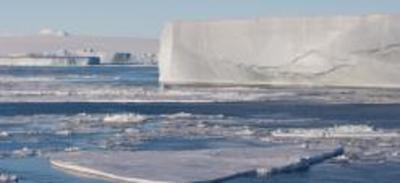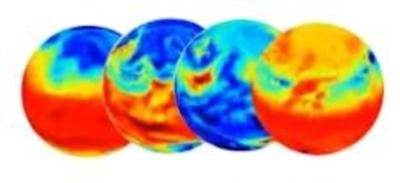Climate
Understanding the climates of earth and other planets represents one of the great intellectual challenges of our era, and in the case of Earth, one of great practical significance. Progress in attaining such an understanding requires the application of knowledge and techniques from many scientific disciplines, including the physics of radiative and convective heat transfer, geophysical and computational fluid dynamics, cloud microphysics, atmospheric chemistry, geochemistry, and biology. PAOC faculty, students, postdoctoral fellows and research scientists are actively engaged in research on many facets of the climate system.
Atmospheric processes are central to many of the forcings and feedbacks that determine the magnitude of climate change. The atmosphere is also central to many of the possible impacts of climate change, such as changes in the intensities of tropical a...
The vast majority of our understanding of the Earth, its oceans, atmospheres, and life, comes from the most recent 15% of its history. PAOC Deep Time research seeks to shed light on the first 85% of Earth’s history using a wide array of techniques, a...
Understanding the climates of earth and other planets represents one of the great intellectual challenges of our era, and in the case of Earth, one of great practical significance. Progress in attaining such an understanding requires the application ...
As the scientific dialogue on the degree of climate warming continues, the critical question surrounding potential global change has now become: How do we rise to the challenge of mitigating and adapting to substantial human interference of the clima...
Climate modeling within PAOC is wide-ranging, encompassing algorithmic, computational, physical, biogeochemical and technological innovations, drawing together elements of computational fluid dynamics, statistics, meteorology, oceanography and comput...
The cryosphere is one of the least understood components in the global climate system, in terms of observations, theory, and comprehensive modeling capabilities. It is also the component that has exhibited some of the largest changes over the last fe...
The total amount and distribution of water in the atmosphere is very sensitive to temperature such that global warming is expected to lead to substantial changes in all aspects of the water cycle.
The ocean state is both a consequence and cause of the climate and its changes we experience through time. Understanding the ways in which the ocean interacts with the remainder of the climate system—including the atmosphere, cryosphere, and biospher...
“The farther backward you can look, the farther forward you are likely to see.” -Winston Churchill





_0.jpg)


